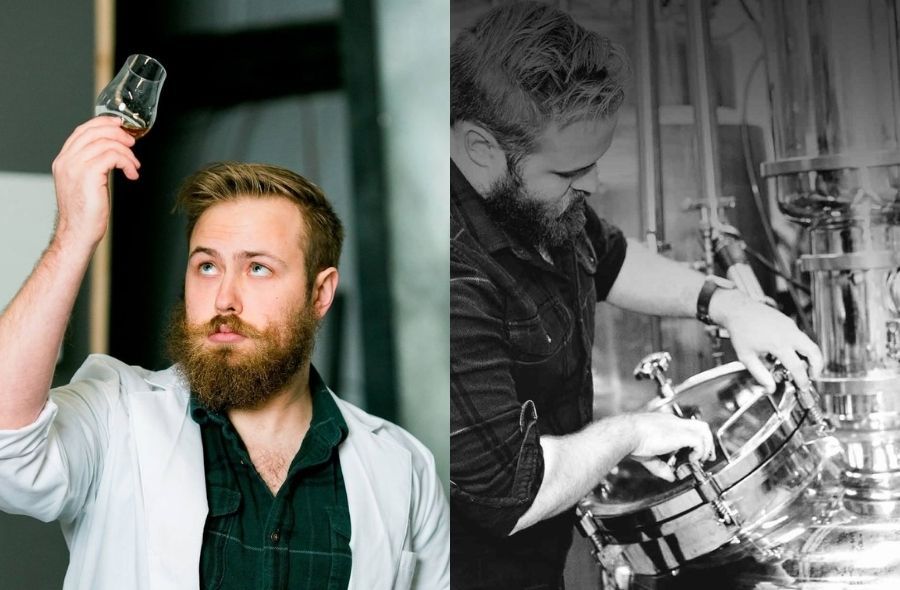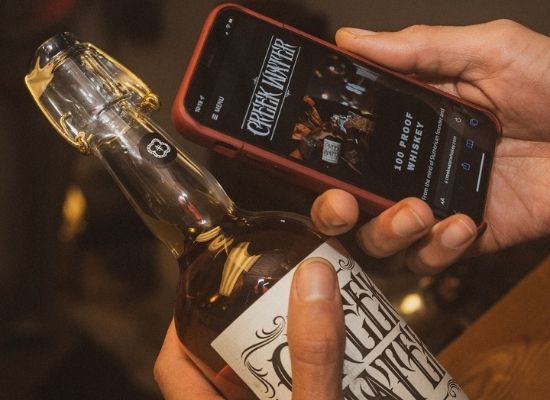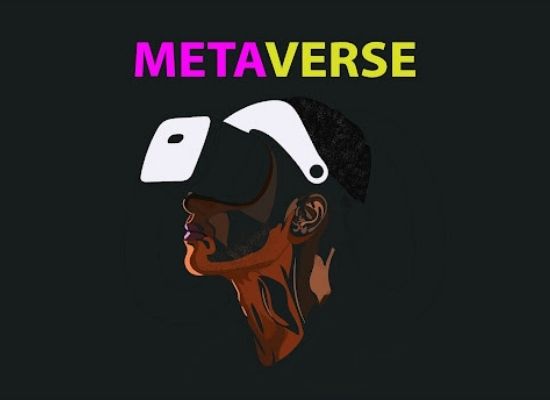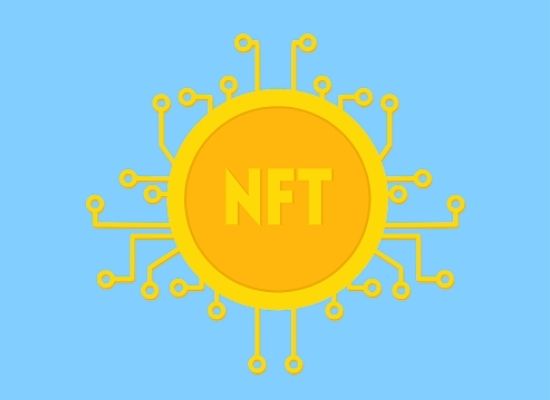May, 2024
San Francisco, USA

Nick is a whiskey enthusiast with a passion for innovative scientific applications in the alcoholic beverage arena. Working with Next Century Spirits, Nick has built several individual brands with a distinguishable factor that sets them apart in the bulk wine and spirit category. Let's take a look at what he has to share with us about the emerging technologies in the alcohol world.
[[relatedPurchasesItems-35]]
Technology has long been viewed as a “taboo” in the wine and spirits industry. The narrative of most large brands revolves around generations of traditional practices, which means that the 800-pound gorillas of our business have been historically cautious about new tech encroaching on their territory. But make no mistake, even the large producers are funding tech expansion behind the scenes. They’ve seen the data, and all signs point to a growing group of consumers who view innovation as a net positive for the products they purchase. Younger generations of buyers don’t have the same brand loyalty as previous groups, and they crave new drinking experiences. Technological approaches can help achieve this. Go to a store that sells alcohol, and you’ll see a wide variety of bottles and cans that feature QR-coded, exclusive content or augmented reality (AR) tech.
As is the case for most commercial industries, the spirits business is becoming increasingly connected to online sales platforms. As the rules regarding DTC shipping become more accommodating, we expect to see a surge in online sales over the next 10 years. The consumer is becoming more and more driven toward convenience-based transactions, which is great for emerging spirits providers who are looking for access to a wider audience in a larger geographic footprint. Ask any growing distillery or spirits brand; Establishing an effective distribution network by yourself is an uphill battle. This gives them an alternative to that approach.
The most effective technology is born out of necessity. Predicting growth patterns for grain or grapes, monitoring fermentation rates, maximizing distillation cuts, and other process-based technology approaches help producers create high-end products while reducing capital risk. For example, Next Century Spirits created a specialized cask-finishing and filtration technology to allow for the creation of customized flavor profiles that meet consumer expectations and capitalize on growth opportunities. This improves margins and reduces lead times for the producer and helps push innovation in an industry that is notoriously resistant to change. Cask finishing is an understood and accepted practice and plays a huge role in the overall quality of a spirit, so we simply asked, “How can we maximize this value?” But let’s be clear: “technology” approaches that claim “rapid-aging” capabilities, or include adding cheap flavors into vodka and passing it off as “whiskey” are not effective approaches for one distinct reason: Quality is king. If a product cannot live up to its promise of quality, no one will buy it, no matter how novel it is. But if the quality is good? Well, who wouldn’t want to pay less for a better quality whiskey or wine?

Image Source: Creek Water Spirits
This is a luxury industry, meaning that exclusivity is a highly sought-after parameter in the products. Most of the time, the closest way you can achieve this is to get your hands on single barrel releases or barrel picks for social groups. Offering higher levels of bottle customization on DTC platforms could really help fuel the demand for personalized liquor. It comes with awesome regulatory hurdles, but we’ve found ways to navigate those effectively.
Blockchain and crypto are definitely hot topics in the tech industry. AI will likely play a notable role in tracking and predicting consumer buying behavior in alcohol sales, and blockchain-based tech is becoming increasingly popular as a medium to exchange decentralized currency for goods. It’s only natural that this would apply to buying beer, wine, and liquor. The largest struggle there will likely be the highly protected tax structure around the sale of alcohol in the United States.
Subscription services are nothing new in the wine and spirits industry (think Flaviar as a prime example). The real value seems to be in offering exclusive products to consumers through online platforms that can be shipped to them directly. We, like many brands, help showcase the quality of our products through international quality competitions. When we win best-in-class awards for products like our American single malt whiskey, Bear Fight, there are opportunities for online retailers to then offer the award-winning products to the consumer in SaaS format. Then, each year, when we have new releases that consumers can track via these competitions, they can continually get access to the exclusive, highly recommended products that are released.
To a growing number of people, virtual reality is still exactly that; reality. People are obviously willing to spend money in this capacity, meaning that there will be opportunities for sales and marketing of beverages through the expanding platform. Again, people want experiences when it comes to luxury goods and industries, and the Metaverse, love it or hate it, could provide new outlets for these experiences and opportunities involving exclusive purchases. As the tech that supports the graphics and immersion of these systems improves, the interest in these areas will only grow.

Wine and spirits are heavily reliant on the forestry industry to maintain the quality of their products since oak barrels are used to age and improve the quality of the liquid. One of the technologies developed and employed by Next Century Spirits allows us to create and integrate oak barrels and containers that can minimize the wood consumption by up to 10X, and to utilize used barrels and casks at a rate requiring roughly 2-5 times fewer containers than other commonly used methods. Millennials and Gen Z often rate the sustainability of products as one of the largest driving factors behind their purchases, so this is a material difference. We’re a company originally born out of the forestry and sustainable wood science industry, so helping fight deforestation through environmentally-conscious practices is a priority for us.

Any technology that creates access to a product that is otherwise difficult to find in certain geographic areas is going to add value for suppliers. DTC and online sales platforms are revolutionizing how people buy spirits. Most small distilleries and growing brands will be looking to leverage any technological advantage they can find to grow their case sales.
A few major trends we’re seeing on the sales side of the industry include AR, DTC online platforms, crypto plays, and NFTs. On the liquid side of things, there is huge interest in customized cask finishing technology. This is the single biggest way to increase your margin on retail bottle sales and gain access to iterative options for LTO releases. This interest in unique, approachable taste profiles isn’t going away any time soon.

The current real value of NFTs in wine and spirits is that they provide an opportunity for distilleries and brands to create digital/virtual assets that command premium prices based on their represented products. The exclusivity factor that I mentioned previously can be leveraged for access to specialized products and rare releases. I’ll put it this way: Premium spirits are all about the juxtaposition between quality and exclusivity, so as a premiere development group of fully-customized liquor, we have big plans in the NFT space.

Consumers have historically wanted to find ways to access more utility and ownership in their favorite brands. Digital assets like NFTs could be the future of how this process is established and maintained. It removes some of the clunkiness of physical barrel ownership (and the legal/insurance/transfer issues it presents) and offers uniquely accessible equity that helps connect the investor or consumer with that brand.
Interviewed by Arjun Moghe, Beverage Trade Network